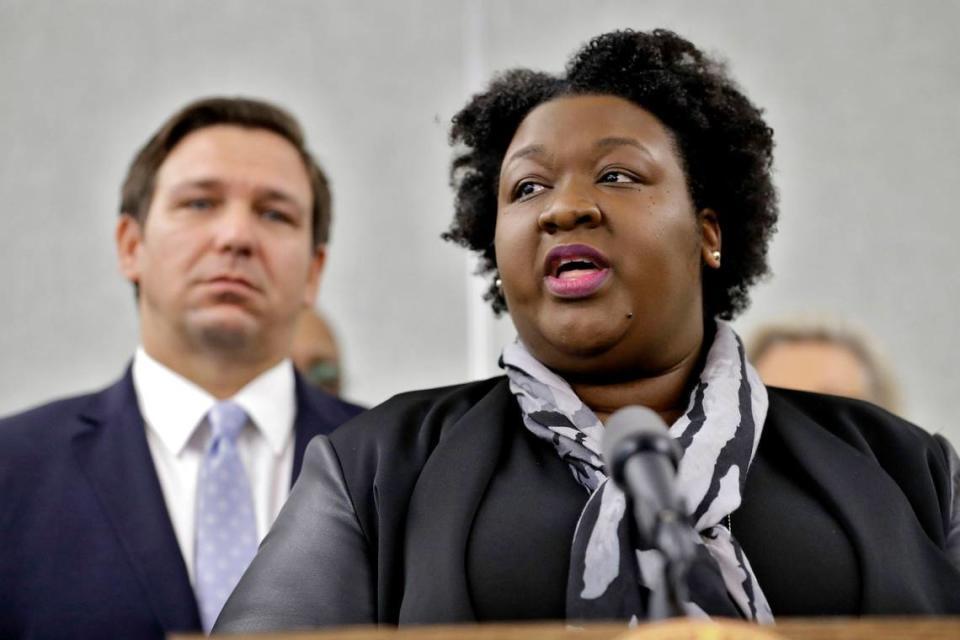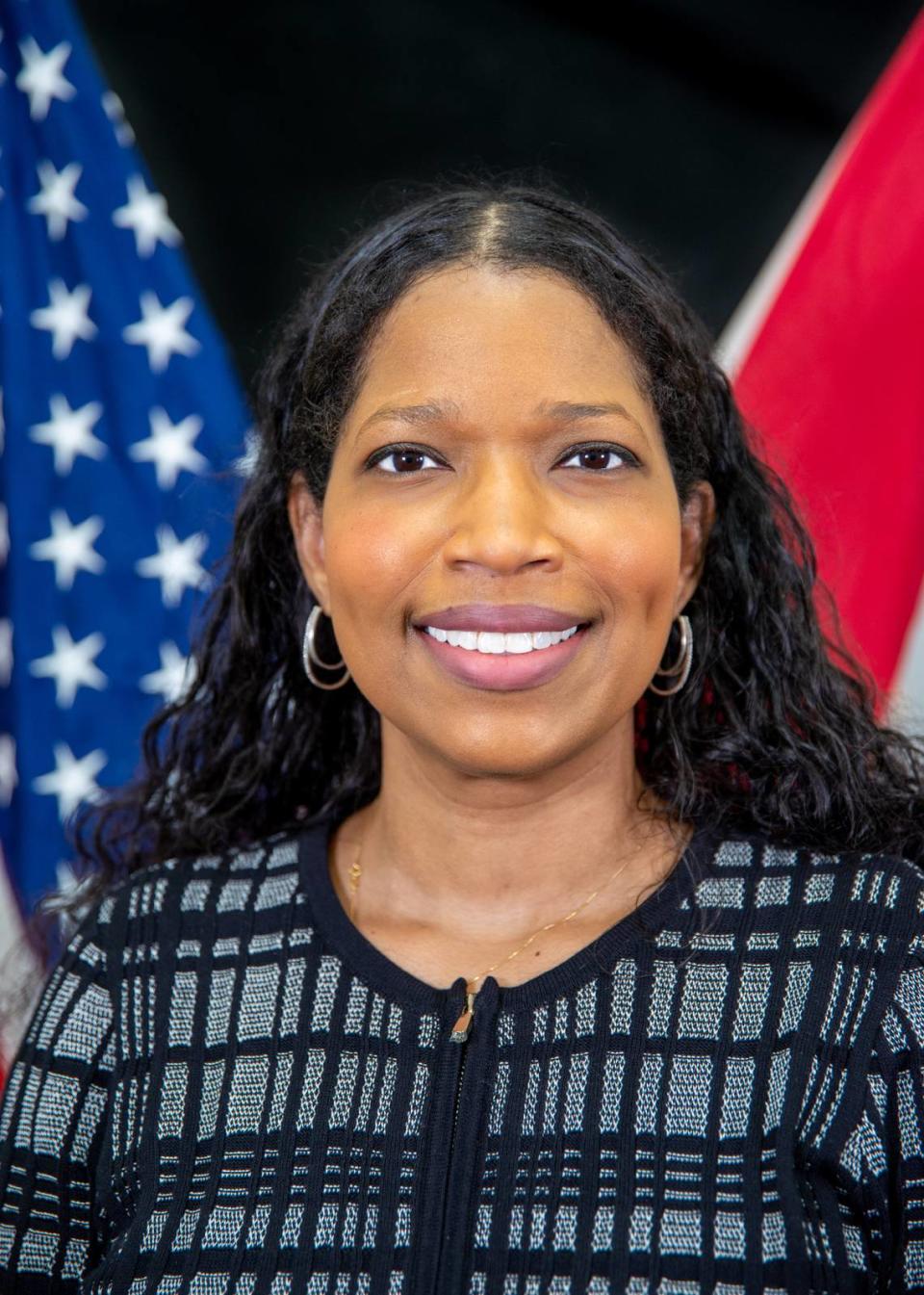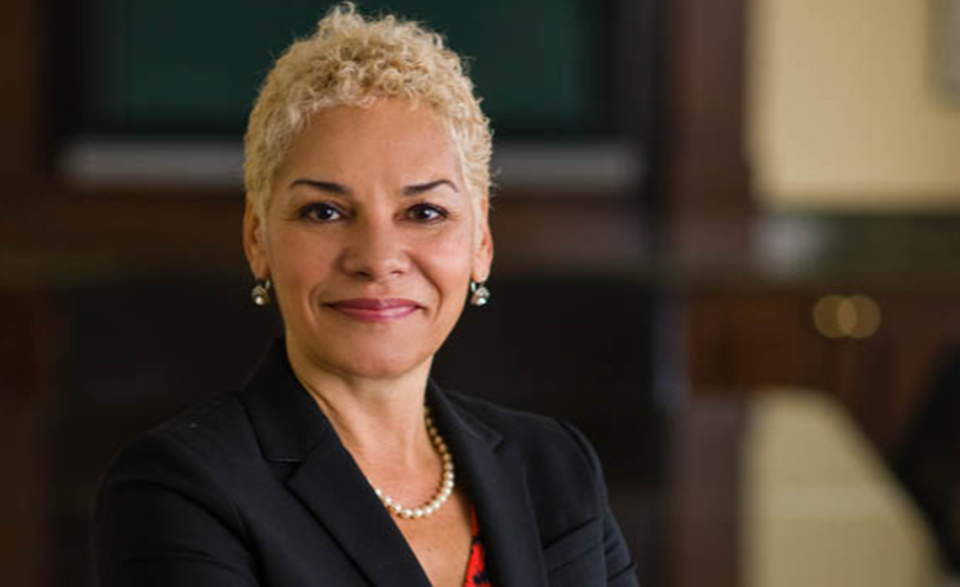Black women newly installed in state healthcare leadership positions emphasize equity
Shamarial Roberson remembers the wait.
Her grandfather had suffered a stroke and needed a doctor immediately. Roberson, then just under 10 years old in a North Florida town of about 800, could do nothing but watch time tick away while paramedics made their way from a nearby city.
“I understand what it means when we read in textbooks that there’s limited access [to medical care] in rural areas,” said Roberson, 35, a Greenville native who’s now a top official at the Florida Department of Health.
In February, Gov. Ron DeSantis appointed two Black women to lead major state health agencies. Shevaun Harris now leads the Department of Children and Families, and Simone Marstiller is the new secretary of the Agency for Health Care Administration. Add Roberson, the Department of Health’s deputy secretary for health, to the list, and Black women are at or near the top of three major state health agencies.
DeSantis made the appointments as the pandemic forced a national reckoning on inequities in the American healthcare system. Black Floridians face myriad challenges. While being infected and hospitalized with COVID-19 at disproportionately high rates, they’re also underrepresented among those getting vaccinated statewide.
The coronavirus pandemic only exacerbated inequities that have spanned decades. Acute mental health issues, high death rates from cancer and severe complications from childbirth all burden Black Floridians disproportionately. Among reasons for these cited by experts are: income and insurance disparities; the healthcare system’s inherent racial biases; the stress that comes with navigating decades of racism.
Experts and Florida officials say representation matters. Harris, Marstiller and Roberson bring diverse perspectives that could leave the state better equipped to fight these challenges, they say.
“I give [DeSantis] all credit for making the appointments that he has made,” said Marstiller, the new secretary for the Agency for Health Care Administration, which administers the state’s Medicaid program and regulates more than 48,000 healthcare facilities. “It’s important for people to see diversity among their state leaders.”
DeSantis is “recognizing talent,” said Haywood Brown, who until April 2 was the University of South Florida’s vice president of institutional equity. In that capacity, Brown, an obstetrician-gynecologist by trade, led the university’s diversity and inclusion efforts both on campus and in the community. In a state like Florida, “you have to have a talented, diverse pool of individuals who can represent the people,” he said.
But experts say representation alone won’t be enough. For leaders to overcome these inequities, they must pursue policies that address them and ultimately get backed by others in power, said Katrinell Davis, an associate professor of sociology and African American studies at Florida State University.
“We can’t assume that things are going to change overnight — or in any way — because these Black women are appointed to these positions,” Davis said. “We need to see what type of policies they’re going to support.”
Managing political agendas
The women DeSantis has appointed will implement policies dictated by Republicans. For example, Joan Alker, the executive director of Georgetown’s Center for Children and Families, said one of the most effective things Florida could do to improve health inequality is expand Medicaid under the Affordable Care Act. Yet Republicans like DeSantis are opposed to expanding the program. They argue Medicaid is not worth the cost to the taxpayer.
Still, the women hold offices that have considerable power.
Roberson, who joined the Department of Health in 2016 and whose current salary is $144,200, said she’s proud of her record fighting health inequality in Florida. Central to that record, she says, is her work mentoring college students. She hopes that young Black professionals will note her ascension to the highest levels of Florida’s government.
“This will give other minority populations and people that want to go into fields such as public health the hope that it is possible to achieve a career in public health and be a valued member of the team,” Roberson said.

She helped her department set the state’s health priorities in a sweeping health plan meant to cover the years 2017-2021. The document outlines nine broad goals, and health equity is at the top of the list.
But the pandemic showed how deeply entrenched health inequality is in Florida: The state has been slow to mitigate the high COVID-19 case rates and low vaccination rates in communities of color. (Since the Fall, the gap in deaths per capita among Black and white Floridians has narrowed, according to the COVID Tracking Project.)
While Florida is making some progress in reducing the number of new cancer cases, according to a recent statewide health assessment, progress lags in other areas: Black men remain more likely than white men to develop certain forms of the disease, be diagnosed in later stages, and die from the disease. Black people are more likely to be diagnosed with colon and prostate cancer than any other ethnic group.
And although Black women are as likely as white women to be diagnosed with breast cancer, they are more likely to die.
Harris, a 41-year-old native of Brooklyn who moved to Florida to attend Florida State University, said she’s made equity a focus of her work. Before her most recent appointment to the Department of Children and Families, Harris worked on the state’s Medicaid program at the Agency for Health Care Administration. (Medicaid is a state and federal program which gives health insurance to hundreds of thousands of poor Floridians — mainly children.) Most recently, Harris was the agency’s acting secretary from October 2020 to February. She makes $146,000.

She has also taught as an adjunct professor with FSU’s College of Social Work and served as a case manager at Big Bend Cares, an organization that provides services for individuals with HIV/AIDS.
As the incoming Department of Children and Families secretary, Harris will oversee an agency at the center of Florida’s struggle for racial equality. Black children are disproportionately likely to be removed from the care of their parents: just 17 percent of Floridians are Black, but Black kids comprise 29 percent of all kids who are removed.
When asked what she would do to fight for equality, Harris said first she needed a closer look at the problem.
“To the extent that those disparities are present, I will be looking into them,” she said. “We’ll absolutely address any disparities that are identified.”

Marstiller, 56, is the most seasoned of the three. As agency secretary, her salary is $165,800. A native of Liberia and a veteran of Florida state government, Marstiller first worked in the Jeb Bush administration starting in 2001, where she served as assistant general counsel — just the first of many titles she would go on to hold in state government.
Most recently, Marstiller has also served as a judge on the First District Court of Appeal, and as the secretary of Florida’s Department of Juvenile Justice.
At the Department of Juvenile Justice, Marstiller witnessed the way young Black Floridians disproportionately interact with the criminal justice system. According to the department’s own data from 2017-18, Black kids comprised half of all juvenile arrests in Florida.
Marstiller said she worked to bring racial equality to the forefront by organizing a webinar with various state and local officials who work across the criminal justice space: judges, prosecutors, public defenders, etc.
“We brought them together and really talked about the importance of recognizing where, at all the decision points across the system, where and how those decisions can have an affect on racial disparities,” Marstiller said.
As the juvenile justice secretary, Marstiller was criticized by criminal justice advocates earlier this summer. Those advocates wanted Marstiller’s department to more aggressively test for the coronavirus at the state’s juvenile detention facilities. (At the time, Marstiller contended that her agency was “vigilant in our fight against COVID-19.”)
Experts say the new secretaries will have enormous responsibilities while Florida rebounds from the coronavirus pandemic — but also a great deal of opportunity. Diverse picks could help convince Floridians from all different backgrounds that the state is fighting for their interests. But only if the policy reflects a commitment to reduce disparities.
“I applaud the diversity in these picks,” said state Rep. Fentrice Driskell, D-Tampa, but added: “we cannot afford to have appointments that are merely performative.”
The Foundation for a Healthy St. Petersburg provides partial funding for Times stories on equity. It does not select story topics and is not involved in the reporting or editing.

